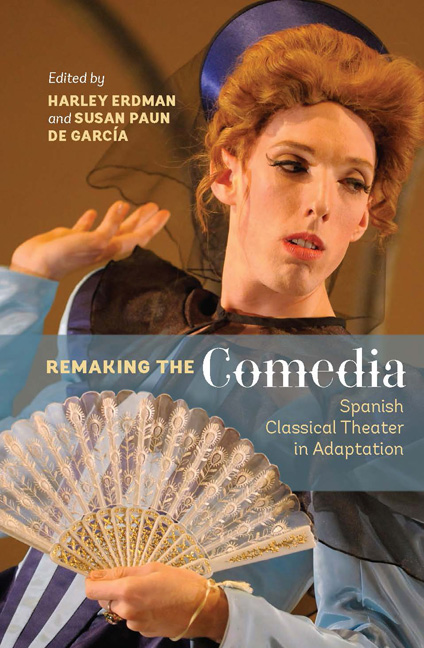Book contents
- Frontmatter
- Contents
- Illustrations
- Contributors
- Preface
- Note to the Reader
- Acknowledgements
- PART I THEORIZING
- PART II SURVEYING
- PART III SPOTLIGHTING
- 11 The Dog in the Manger: The Continuum of Transformation
- 12 El caballero de Olmedo: Los Barracos's Baroque Gentleman
- 13 Corpus Lorqui: Transformation and Transubstantiation in Los Barracos de Federico’s El caballero de Olmedo
- 14 The Phoenix of Madrid: Calderón's No hay burlas con el amor Reborn in Bath
- 15 A Prince in Pittsburgh: “Recasting” a Contemporary Staging of The Constant Prince
- 16 Directing Marta the Divine: Provocative Choices in the Service of the Story
- 17 The Dramaturgy of Absence: Minding the Gaps in Tirso de Molina, Ana Caro, and Feliciana Enríquez
- 18 Translations and Transgressions: Twenty-First-Century Questions Regarding Zayas
- 19 Comedia Actresses, Then and Now: The Case of Ana Caro's Valor, agravio y mujer
- 20 “Kinesthetic Empathy” and the Comedia refundición
- PART IV SHIFTING
- Play Titles Cited
- Works Cited
- Index
13 - Corpus Lorqui: Transformation and Transubstantiation in Los Barracos de Federico’s El caballero de Olmedo
from PART III - SPOTLIGHTING
Published online by Cambridge University Press: 05 December 2015
- Frontmatter
- Contents
- Illustrations
- Contributors
- Preface
- Note to the Reader
- Acknowledgements
- PART I THEORIZING
- PART II SURVEYING
- PART III SPOTLIGHTING
- 11 The Dog in the Manger: The Continuum of Transformation
- 12 El caballero de Olmedo: Los Barracos's Baroque Gentleman
- 13 Corpus Lorqui: Transformation and Transubstantiation in Los Barracos de Federico’s El caballero de Olmedo
- 14 The Phoenix of Madrid: Calderón's No hay burlas con el amor Reborn in Bath
- 15 A Prince in Pittsburgh: “Recasting” a Contemporary Staging of The Constant Prince
- 16 Directing Marta the Divine: Provocative Choices in the Service of the Story
- 17 The Dramaturgy of Absence: Minding the Gaps in Tirso de Molina, Ana Caro, and Feliciana Enríquez
- 18 Translations and Transgressions: Twenty-First-Century Questions Regarding Zayas
- 19 Comedia Actresses, Then and Now: The Case of Ana Caro's Valor, agravio y mujer
- 20 “Kinesthetic Empathy” and the Comedia refundición
- PART IV SHIFTING
- Play Titles Cited
- Works Cited
- Index
Summary
Since his disappearance on the night of August 19, 1936, Federico García lorca has undergone something of a hagiographic transformation. luis Felipe higuera Estremera notes that lorca's story has become something of a “literary myth” (572), while paul Julian Smith has described the cinematic representation of lorca's death in the 1987 television series Lorca, muerte de un poeta as a “resonant and reverent fetishization” of the passion of Christ (111). Indeed, the hagiographies dedicated to lorca's memory represent an ever-enlarging corpus. One recent addition is los Barracos de Federico's production of lope de Vega's El caballero de olmedo, which premiered in 2007 at the twenty-fourth annual Jornada del Siglo de Oro festival in Almería, Spain, and has since been performed in a number of venues in both Spain and abroad, including at the Chamizal National Memorial Siglo de Oro drama Festival in El paso, Texas in March of 2009.
Los Barracos's production, adapted and directed by Amaya Curieses Iriarte, exists as a kind of play-within-a-play. The outer frame of this composite theatrical act consists of a re-enactment of lorca's famous theater troupe, La Barraca, with Curieses Iriarte's twenty-first-century actors portraying their early twentieth-century counterparts. The inner core of this theatrical act consists of a performance supposedly by this early twentieth-century touring company of lope's El caballero de olmedo. This double performance unfolds as follows. As the play opens, los Barracos enter from the back of the house, wearing what Gwynne Edwards calls the “blue boiler suits [and] simple blue and white dress[es]” that constituted the “common uniform” of the men and women of la Barraca (“Theatre Workshop” 307). As if having just arrived in a new town, Los Barracos briefly play the tourist, snapping pictures of each other and of the crowd, before unloading the minimalist set pieces that they will eventually use to perform El caballero de Olmedo.
- Type
- Chapter
- Information
- Remaking the ComediaSpanish Classical Theater in Adaptation, pp. 123 - 132Publisher: Boydell & BrewerPrint publication year: 2015



